|
|
|
Sort Order |
|
|
|
Items / Page
|
|
|
|
|
|
|
| Srl | Item |
| 1 |
ID:
074912
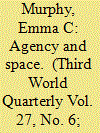

|
|
|
|
|
| Publication |
2006.
|
| Summary/Abstract |
Recent political reforms in the Gulf Arab countries have been variously understood as regime survival strategies, correlates of economic globalisation, and even the end result of US pressure to democratise. This paper examines the possible role played by the introduction of modern information and communication technologies (icts) in stimulating political liberalisation in the Gulf Arab states. Rather than attempting to quantify their democratising impact, this paper utilises the concept of agency, examining how the range of agents of ict production and diffusion in the region have sought to influence the actual impact upon political space. It concludes that modern icts have demonstrated the potential to expand the existing public sphere, and to create new opportunities for liberal political activity. However, the particular configuration of agency in the countries in question has meant that the state and its allies have retained a significant degree of control over the extent and nature of the political space, a process in which local society may have in some instances collaborated. Thus, while the introduction and diffusion of new icts may have contributed to the pressures which led to some of the political reforms in evidence in the Gulf Arab states, one cannot argue that they amount, at least as yet, to a sustained and effective attack on illiberal political structures. The first part of this paper surveys the existing body of literature in an effort to devise a framework for the subsequent study of two principal contemporary icts (satellite television and the internet) in the Gulf Arab states.
|
|
|
|
|
|
|
|
|
|
|
|
|
|
|
|
| 2 |
ID:
074908
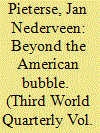

|
|
|
|
|
| Publication |
2006.
|
| Summary/Abstract |
In the 21st century, does empire make sense? From the viewpoint of flexible and increasingly de-territorialised capitalism, does empire matter or is it a costly liability? Are the new wars an expression of US capitalism or do they reflect a US superpower syndrome and path dependence on the national security state? This paper takes the latter view and argues that the superpower syndrome is embedded in the American bubble. Civilian casualty rates in Iraq and Afghanistan are extraordinarily high. This occurs at the confluence of several trends: the USA seeking land power on a distant continent, the tendency to view countries as strategic real estate and the American bubble that leads Americans to underestimate resistance. In closing I draw a balance sheet of whether and how empire matters and briefly address the global realignments that are underway.
|
|
|
|
|
|
|
|
|
|
|
|
|
|
|
|
| 3 |
ID:
074910
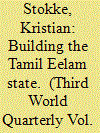

|
|
|
|
|
| Publication |
2006.
|
| Summary/Abstract |
Sri Lanka's civil war has created a political – territorial division between the government of Sri Lanka and the Liberation Tigers of Tamil Eelam (ltte), where ltte is engaged in a process of state building within the areas they control. The article examines this state formation with an emphasis on the functions and forms of governance that are embedded in the new state institutions. It is observed that the emerging state formation has a strong focus on external and internal security, with an additional emphasis on social welfare and economic development. In terms of governance, the ltte state apparatus is marked by authoritarian centralisation with few formal mechanisms for democratic representation, but there are also partnership arrangements and institutional experiments that may foster more democratic forms of representation and governance. Hence, resolving the security problem in tandem with political transformations towards democratic governance remain prime challenges for peace building in northeast Sri Lanka.
|
|
|
|
|
|
|
|
|
|
|
|
|
|
|
|
| 4 |
ID:
074907
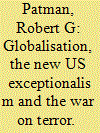

|
|
|
|
|
| Publication |
2006.
|
| Summary/Abstract |
This article focuses on the tensions between a new exclusive US exceptionalism after 9/11 and a globalised security environment. The terrorist attacks in Washington and New York revealed that even the world's only superpower is vulnerable to the type of transnational violence that had blighted other countries during the post-cold war era. Yet these events, at least in the short term, have served to intensify the ‘distinctive American internationalism’ of the Bush administration. This trend culminated in the USA bypassing the authority of the UN Security Council and leading an invasion of Iraq in March 2003. Nevertheless, there are growing signs that this new American exceptionalism has become a serious impediment to effectively prosecuting the war on terror. In the era of globalisation it is the support of other nations and multilateral institutions that offers the best hope of ensuring that the USA lives in a more secure world. Without moving to a more inclusive form of exceptionalism, Washington will struggle to sustain the level of international support that it needs to prevail in the current struggle against terrorism.
|
|
|
|
|
|
|
|
|
|
|
|
|
|
|
|
| 5 |
ID:
074909


|
|
|
|
|
| Publication |
2006.
|
| Summary/Abstract |
A critical analysis of the current political crisis in the Philippines is undertaken, using a neo-Gramscian focus on the emergence and alternation of hegemonic historical blocs and the state. Twenty years after the so-called ‘people's power’ uprising restored constitutional democracy and became something of an international model of ‘peaceful’ political transformation, the Philippines is again facing a protracted political crisis. The government of President Gloria Macapagal-Arroyo has become embroiled in accusations of corruption and vote rigging in elections. While Arroyo has survived thanks to strong support in the country's House of Representatives, and to the similar discrediting of the formal political opposition, she remains deeply unpopular. The crisis is traced to the impacts of nationally and globally induced forces that allowed the deep-rooted entrenchment of a hegemonic political bloc based on land-owning capital. This bloc, while undergoing some alterations, has ensured operation of a form of path dependence based on poverty and social exclusion. Despite numerous political upheavals, the power of this bloc has not been substantially changed. The Philippines now faces an option of consolidated power of the bloc through Arroyo's constitutional reform initiatives or the prospect of a more radical rupture in political and social relations. The international significance of the Philippine case demonstrates that the turn to democratisation over the past 20 years has not reduced antagonistic social and political conflicts in many cases and that more sustained structural changes are required.
|
|
|
|
|
|
|
|
|
|
|
|
|
|
|
|
| 6 |
ID:
074916
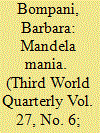

|
|
|
|
|
| Publication |
2006.
|
| Summary/Abstract |
This paper investigates the public role of mainline churches in post-apartheid South Africa and their interaction with the political discourse. The action of churches in the public sphere in the 1990s has been commonly defined as ‘critical solidarity’ and their voice was of support and alignment with the African National Congress (anc) position in the process of nation building. Through an analysis of political and religious discourse this paper aims to demonstrate that it is possible to identify a shift in the churches' action in the past five years, passing from a position of alignment and non-confrontation with the government to a situation of disengagement and critical opposition. This reshaped relationship highlights the internal and external difficulties of the anc in shifting from liberation to democracy. This is underscored by the generation of rhetoric and myth that preclude critical spaces, asserting the inalienable right of the anc to produce all political discourses.
|
|
|
|
|
|
|
|
|
|
|
|
|
|
|
|
| 7 |
ID:
074914
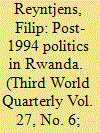

|
|
|
|
|
| Publication |
2006.
|
| Summary/Abstract |
When the Rwanda Patriotic Front (rpf) seized power in July 1994, winning the civil war and ending the genocide, this was seen by many as the succession of a bloody dictatorship by a decent government. Despite the early drift into authoritarianism, concentration of power and human rights abuse, Rwanda continued to be seen as a country in transition towards democracy. However, political transitions do not automatically lead from dictatorship to democracy, and Rwanda is but one of the illustrations of the weaknesses of the transition paradigm. Rather than liberation, inclusiveness and democracy, the rpf has brought oppression, exclusion and dictatorship. People's widespread and deep-rooted feelings of frustration, anger and despair are a fertile breeding ground for structural violence, and they are likely to again lead to acute violence.
|
|
|
|
|
|
|
|
|
|
|
|
|
|
|
|
| 8 |
ID:
074913


|
|
|
|
|
| Publication |
2006.
|
| Summary/Abstract |
This article examines the politics of African states in which insurgencies or liberation movements have taken control of the government. It analyses the impact on governance of reforms introduced by these post-liberation regimes, their relations with traditional authorities and civil society and relationships within and between competing guerrilla movements. It interrogates the nature of the state that emerges from this process. The ‘post-liberation’ state label is argued to be both meaningful and useful, as part of a larger project of exploring and explaining the post-colonial African state, highlighting debates about representation, citizenship and nation building. While post-liberation regimes have advantages in implementing state building projects, they are also subject to contestation when the new state institutions and regime incumbents become too exclusivist or predatory.
|
|
|
|
|
|
|
|
|
|
|
|
|
|
|
|
| 9 |
ID:
074915


|
|
|
|
|
| Publication |
2006.
|
| Summary/Abstract |
This article explores Namibian state formation and citizenship through the case of ex-combatant ‘reintegration’, particularly its focus on government employment provision since the mid-1990s. It examines the discourses that have motivated the targeting of ex-combatants, the practical measures taken towards ‘reintegration’, and ex-combatants' own initiatives and responses. Analytically it focuses on the implications of ‘reintegration’ for relations between the state and its population or citizens, particularly the drawing of lines of inclusion and exclusion, and the tension that appears between personalised and bureaucratic tendencies of rule.
|
|
|
|
|
|
|
|
|
|
|
|
|
|
|
|
| 10 |
ID:
074911
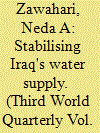

|
|
|
|
|
| Publication |
2006.
|
| Summary/Abstract |
The future stability of the young and relatively weak Iraqi government rests on its ability to provide basic public goods—water, food, and electricity—to its populace, which is related directly to stabilising the quality and quantity of its available water supply. Since 98% of Iraq's water comes from the Euphrates and Tigris rivers, both of which originate and flow through several countries before entering Iraq, stabilising the water supply becomes an international issue. In other words, to stabilise Iraq's water supply, there needs to be a comprehensive agreement between the states sharing the Euphrates and Tigris. As this article argues, an agreement is possible when states have an interest in co-operation, a neutral mediator facilitates the negotiations, and a river commission is established to maintain long-term co-operation. Due to important changes today the states sharing the Euphrates and Tigris rivers confront favourable conditions that can lead to an agreement.
|
|
|
|
|
|
|
|
|
|
|
|
|
|
|
|
|
|
|
|
|